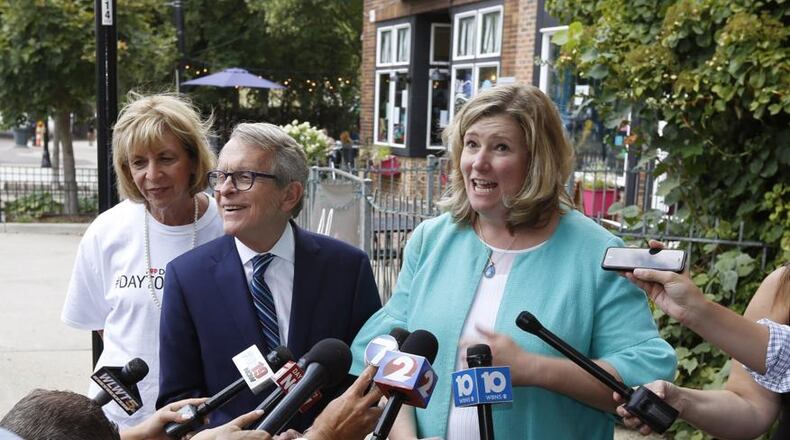Democratic candidate Nan Whaley is the immediate former mayor of Dayton, and incumbent Republican Gov. Mike DeWine is a resident of Cedarville.
A governor’s race featuring two candidates with local ties will raise the area’s profile relative to other parts of the state, said Bob Taft, former Ohio governor, legislator and secretary of state.
“Traditionally you’ve had the ‘three Cs’: Cincinnati, Columbus and Cleveland,” he said.
Those large metro areas have plenty of clout in state government, so for smaller cities like Dayton, Springfield and others in the Miami Valley, it’s important to have someone in the capital whose attention can help them compete, Taft said.
“Ohio’s a big state with a lot of competing interests, and it always helps to have your voice heard,” he said.
Taft grew up in Cincinnati and lived in Columbus for some time, but now is a distinguished research associate at the University of Dayton.
It’s certainly unusual to have two gubernatorial candidates from the Miami Valley, DeWine said.
“James Cox was the last governor from the Miami Valley, and that’s been 100 years ago,” DeWine said. “Ironically, he was also governor during a pandemic.”
Cox owned the Dayton Daily News, which is still owned by his family’s Cox Enterprises, and served twice as Ohio governor. His second term coincided with the 1918 flu pandemic.
Originally from Mooresville, Indiana, Whaley came to Dayton for college and remained. She served in several local offices before her 2013 election (and subsequent reelection) as Dayton mayor.
She said she’s now spent more than half her life in Dayton, and though DeWine is also from the area, Whaley alleges he’s been in state-level or federal office so long that he has “forgotten the needs of the community.”
“Dayton is similar to many other parts of the state that feel forgotten and ignored,” she said. On her campaign travels to smaller towns, she saw more similarities to Dayton than to larger cities, Whaley said.
The Democratic ticket for statewide offices is packed with people from outside Ohio’s three largest cities, she said.
“You have a lot of suburban folks, which I think is interesting,” Whaley said, noting that her own running mate, Cheryl Stephens, lives in Cleveland Heights, a historic Cleveland suburb.
Whaley believes that indicates people from smaller towns want change, driven by partnerships in the Ohio Statehouse.
“The only way we’re going to do that is by running for statewide office,” she said.
It’s not just gubernatorial candidates, either: the lieutenant governor candidates are both familiar with the Dayton area.
Stephens is vice president of Cuyahoga County Council. Her father, an Air Force veteran, retired near Wright-Patterson Air Force Base; and Stephens herself received a master’s degree from the University of Dayton.
DeWine retains his 2018 running mate, Lt. Gov. Jon Husted, who was raised in Montpelier. Husted now lives in the Columbus area, but attended the University of Dayton, where he played football. He served as a vice president of the Dayton Area Chamber of Commerce before election to the General Assembly representing the Dayton area.
“In terms of the visibility and the voice of the Miami Valley area in Columbus, it’s certainly good news that both candidates for governor understand the needs and the concerns for this part of the state,” Taft said.
As governor DeWine has paid attention to all parts of the state, Taft said, but his Miami Valley roots helped him build community connections and become aware of local concerns.
DeWine was born in Springfield and attended Miami University in Butler County. He worked as an assistant prosecutor in Greene County until his 1976 election as county prosecutor there. Since then he has mostly held statewide or federal offices.
DeWine said one of his first acts as governor dealt with the Dayton area: naming J.P. Nauseef to head JobsOhio. Nauseef is a former president and CEO of the Dayton Development Coalition.
“Second, I named to a cabinet-level position Joe Zeis, whose sole job every day is to be concerned about the retention and expansion of the military installations in the state of Ohio,” DeWine said. Zeis serves as senior adviser for aerospace and defense.
The largest of Ohio’s military installations by far is Wright-Patterson Air Force Base.
Through executive orders and working with the General Assembly, DeWine said, he has also worked to make Ohio friendly for veterans, current military personnel and their families. He cited the authorization granted in 2020 for military spouses to temporarily transfer their professional certifications or licenses from other states when their serving spouse is assigned to duty in Ohio. That originated as a suggestion from people at Wright-Patt, DeWine said.
The region would see “more of the same” in a second four-year term for DeWine, he said, as efforts to expand military installations in Ohio continue.
About the Author

